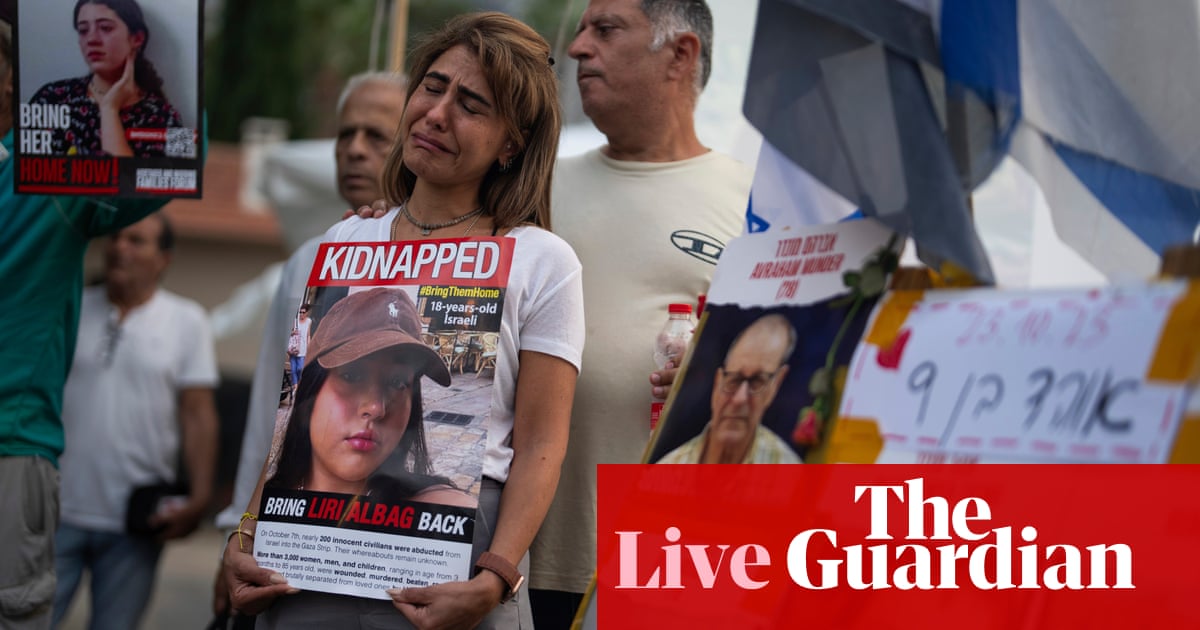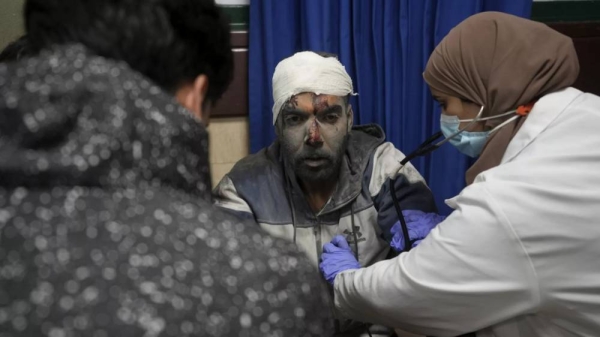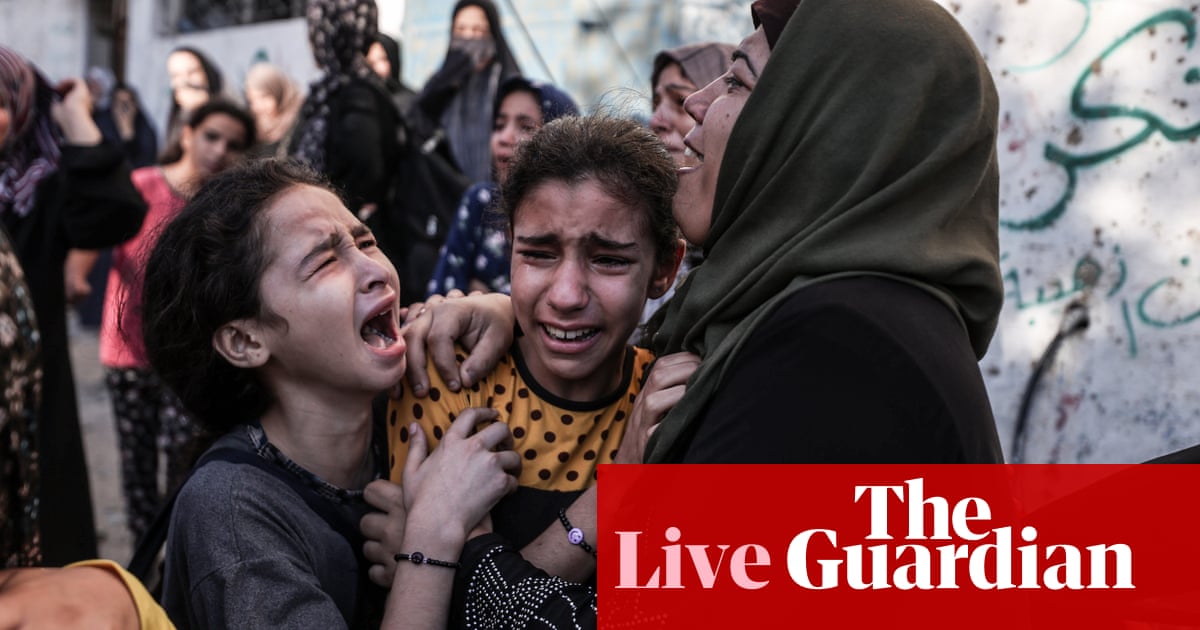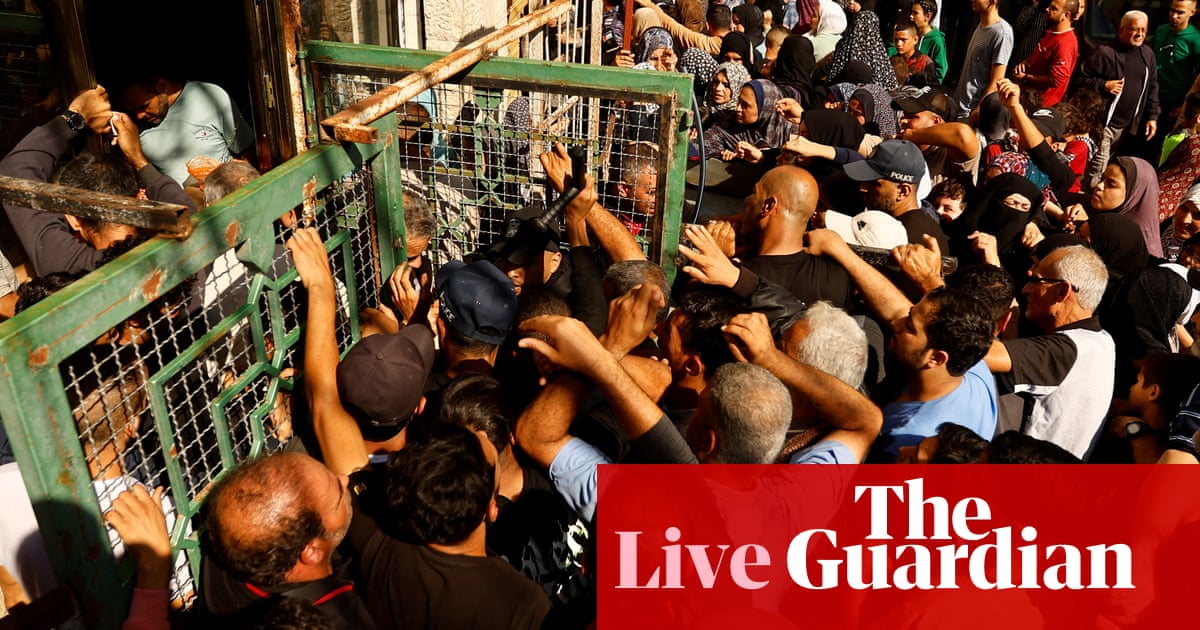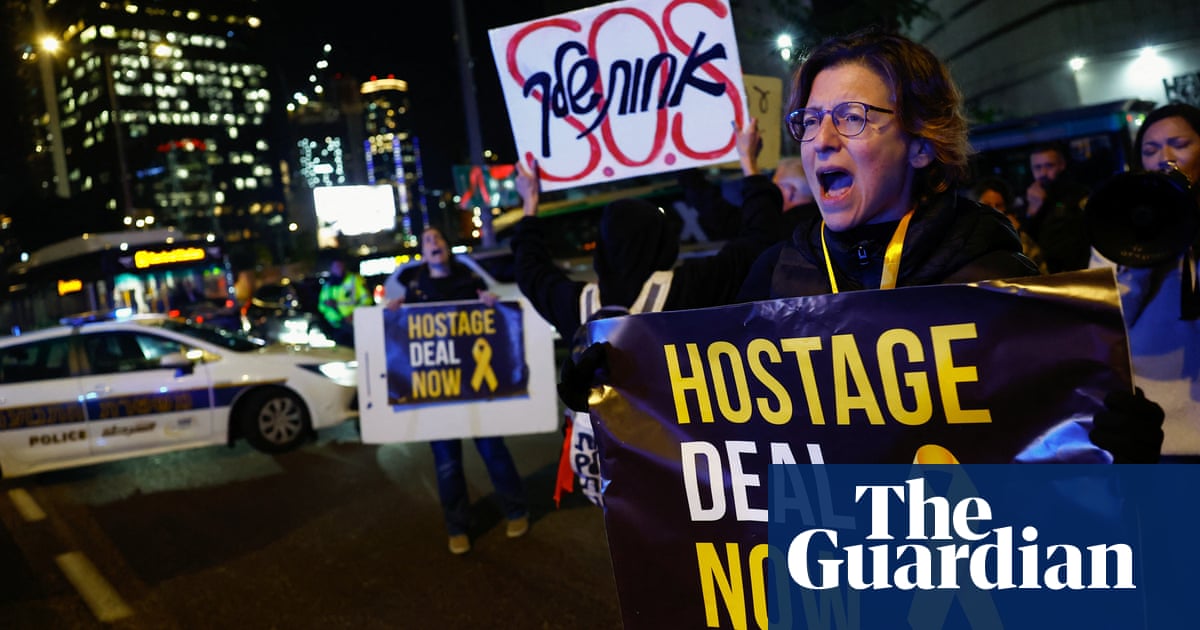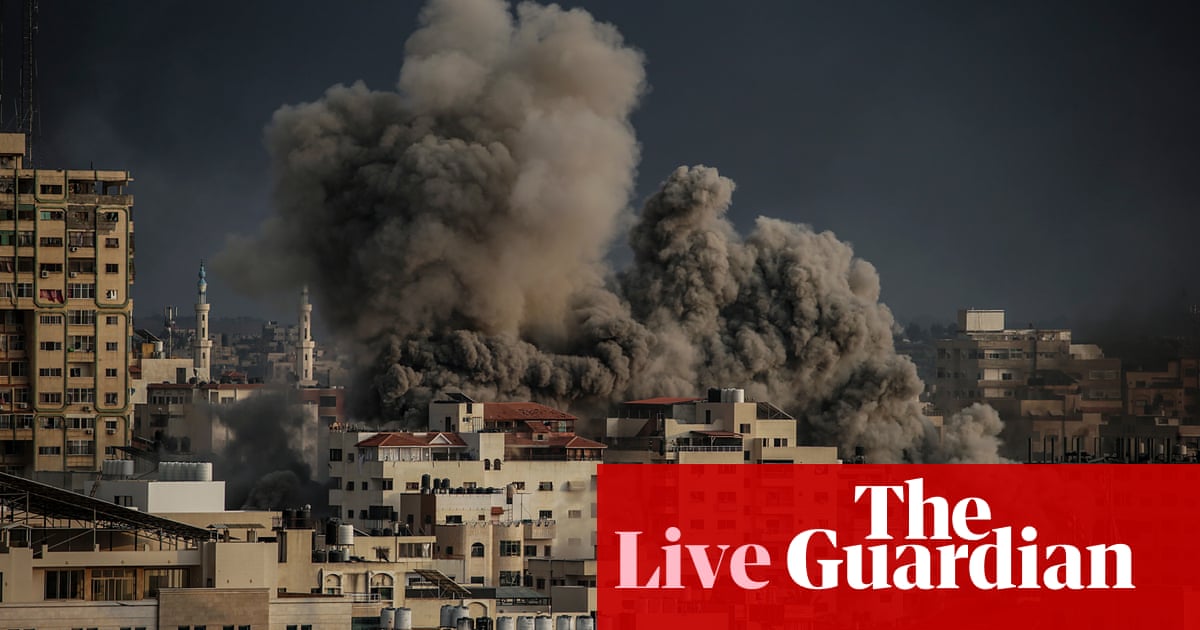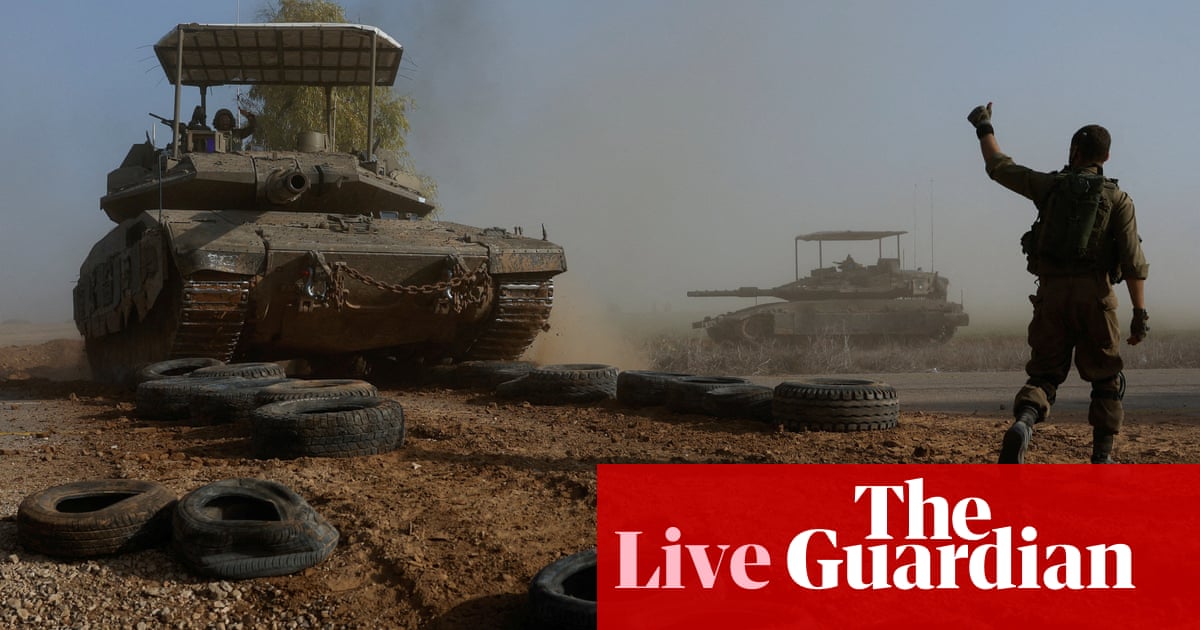
White House: Hamas refusing to release more female hostages to blame for truce collapse
The week-long truce that saw the release of dozens of hostages back to Israel collapsed because Hamas refused to release any more women, the White House said on Monday.
Jake Sullivan, the US national security advisor, has just been briefing reporters about the truce falling apart on Friday, after two extensions. He said the Biden administration “will not rest” until all of the estimated 137 hostages, including nine Americans, held by Hamas are free.
But he said Hamas’s insistence on continuing to detain women meant a pathway to a new truce was not immediately apparent:
Right now, Hamas is refusing to release civilian women who should have been part of the agreement. And it is that refusal by Hamas that has caused the end of the hostage agreement, and therefore the end of the pause in hostilities.
Sullivan said he had been engaged over the weekend in “intensive phone calls with partners in Israel, Egypt, Qatar and other nations”, and he and Joe Biden had met with families of some Americans still being held:
I can tell you it has not gotten any easier. What these families are going through is gut wrenching. It’s heart wrenching, and it’s unimaginable, unthinkable for any of us.
We continue to do everything in our power under the president’s leadership and guidance, with his direct involvement and participation, to try to bring all of these Americans home as well as all of the hostages.
WHO: "Nowhere is safe in Gaza"
The World Health Organization (WHO) has issued a statement expressing its “grave concern” about the resumption of hostilities between Hamas and Israel in Gaza, the bombardment of southern Gaza, and warns that “nowhere is safe” for civilians.
In its message posted to X, formerly Twitter, on Monday afternoon, the organization said it was appealing for protection of the health system from further attacks and degradation of its capacity:
WHO is gravely concerned about the resumption of hostilities, including heavy bombardment in Gaza, and reiterates its appeal to Israel to take every possible measure to protect civilians and civilian infrastructure, including hospitals, as per the laws of war.
We have seen what happened in northern Gaza. This cannot be the blueprint for the south. Gaza cannot afford to lose another hospital as health needs continue to soar.
As more civilians in southern Gaza receive immediate evacuation orders and are forced to move, more people are being concentrated into smaller areas, while the remaining hospitals in those areas run without sufficient fuel, medicines, food, water, or protection of health workers.
Report: Hamas 7 October rocket struck suspected Israeli nuclear base
A Hamas rocket fired during the 7 October attacks struck an Israeli military base where many of the country’s nuclear-capable missiles are believed to have been stored, the New York Times said in a report published Monday.
None of the missiles were struck, although the attack on the Sdot Micha base in central Israel set a fire that “approached missile storage facilities and other sensitive weaponry”, according to the newspaper’s visual analysis.
Israel, which has always maintained a policy of ambiguity over its nuclear arsenal, probably has about 25 to 50 nuclear-capable Jericho missile launchers at the base, Hans Kristensen, director of the Federation of American Scientists’ nuclear information project, told the Times.
The missiles are equipped to carry nuclear warheads, according to experts and declassified US government documents, the newspaper said, although Kristensen noted the warheads were “most likely” kept in a separate location away from the base and not under threat during the attack.
The Times said the strike on Sdot Micha was the first known instance of Hamas hitting a site suspected of containing Israeli nuclear weaponry, although there is no evidence the group knew anything of its target other than it being a military facility.
Here is a selection of images sent to us over the news wires on Monday, relating to the almost two-months-old Israel-Gaza conflict.
A group of Israeli former hostages released by Hamas during the recent pause in hostilities has written to ask the International Committee of the Red Cross (ICRC) to ask it provide medical assistance and to visit relatives still being held in Gaza.
The eight said in their letter that they had endured “harsh conditions” while being held and asked the Red Cross to help secure the immediate release of those still in captivity, and to verify the health status of the captives, according to Reuters.
The Red Cross has not commented on the letter, the news agency said, but has previously called for agreements to allow its teams to check on hostages and deliver medication.
The former hostages said their Hamas captors subjected them to “lack of medical treatment for illnesses and injuries with culpable neglect, severe food shortage and unsanitary living conditions”.
“Some of the hostages undergo psychological and physical abuse,” the letter added, along with a request for the group to meet Mirjana Spoljaric Egger, the ICRC president.
British national killed fighting for IDF
A 19-year-old British national has been killed while fighting for the Israel Defense Forces (IDF) in Gaza.
Binyamin Needham was one of two soldiers killed during an operation in the north of the territory on Sunday, according to a statement released by the IDF.
Needham, the youngest of five siblings, was born in England and emigrated with his family to Israel at the age of eight, Haaretz reported. The newspaper said he was from the town of Zichron Yaakov.
Needham is thought to be the second British national to have been killed serving with the IDF during or after the 7 October attacks. The first was 20-year-old Nathanel Young.
At least five Palestinians killed in West Bank, Gaza health ministry says
At least five Palestinians were killed on Monday by Israeli forces in the occupied West Bank, a statement from the Palestinian health ministry said, reported by Reuters.
Two of the dead were named as Anas Al Faroukh, 23, and Mohamed Al Faroukh, 22, from Sair, who both died from wounds sustained from Israeli gunfire, the statement said.
Earlier Monday, the health ministry said another Palestinian man was killed at the Qalandia refugee camp. At least 22 other Palestinians were injured by bullets in clashes with Israeli forces at the camp, the Palestinian Red Crescent said.
And two Palestinians in a car were killed and two others detained during a raid in the city of Qalqilya, the official Palestinian news agency WAFA reported.
An military spokesperson said the Israel Defense Forces had engaged in “counter-terrorism activity” in the region and would release details later.
Hamas said on Monday that claims of rape and sexual violence by Palestinian militants during the 7 October attacks on Israel were “unfounded lies”, AFP reports.
UN Women condemned last week what it said was widespread “gender-based atrocities and sexual violence during those attacks”.
Israeli police say they have collecting evidence of more than 1,500 incidents of sexual violence by militants who had stormed Israeli communities and army bases, ranging from alleged gang rapes to post-mortem mutilation, AFP said.
Hamas, in its statement released Monday, said the allegations were part of “Zionist campaigns which promote unfounded lies and allegations to demonise the Palestinian resistance”.
Here’s our latest dispatch from The Guardian’s Harriet Sherwood and Jason Burke in Jerusalem about the extension of Israel’s ground assault in southern Gaza on Monday, and the country’s belief its mission in northern Gaza is “almost complete”.
Israeli tanks, armoured personnel carriers and bulldozers have entered the southern part of the Gaza Strip near Khan Younis, as an Israeli commander claimed the army had almost completed its mission in the north.
Israeli military vehicles were on the southern section of the main north-to-south road in Gaza, “firing bullets and tank shells at cars and people trying to move through the area”, a witness, Moaz Mohammed, told the AFP news agency.
The reports came soon after the Israeli military issued fresh orders to Palestinians in about 20 areas of central Gaza to move farther south, posting maps online for people to access via smartphones.
The move was criticised by a leading human rights organisation. Sari Bashi of Human Rights Watch, said Israel was asking people “who don’t have electricity or the internet to somehow scan a barcode to see where they’re supposed to go”.
Despite the Israeli instruction, there was heavy bombing in the south of Gaza overnight and early on Monday.
The White House said it was “too soon” to pass judgment about whether Israel had provided enough notice, or done enough to inform Palestinian civilians where it would be safe to shelter, before launching an assault in south Gaza.
Instead, national security advisor Jake Sullivan noted at his afternoon press briefing that Israel had identified a specific area that it said it would target, and that the US was having an “ongoing conversation” to ensure civilians were protected:
What I can’t judge is how many of the people in that area as of right now have received that communication, because I’m not on the ground. What we have indicated to the Israelis is they need to use every means and tool that they have available, to be sure that when they actually move in, in force into an area in the south, that they do so with some confidence that people have actually gotten safe passage out of that area.
That’s an ongoing conversation we have with them. From our perspective, one of the key lessons from the north was to ensure that as you commence a ground operation, you have got to give civilians the time and capacity and real opportunity to leave.
They have every right to go after the Hamas terrorists who committed this brutal massacre on October 7, and who continue to fire rockets just in the last hours at civilian areas in Israel, but they also have a responsibility to try to protect civilians.
They have indicated that there are areas where there will be ‘no-strike’ zones. And in those zones we expect Israel to follow through on not striking.
White House: Hamas refusing to release more female hostages to blame for truce collapse
The week-long truce that saw the release of dozens of hostages back to Israel collapsed because Hamas refused to release any more women, the White House said on Monday.
Jake Sullivan, the US national security advisor, has just been briefing reporters about the truce falling apart on Friday, after two extensions. He said the Biden administration “will not rest” until all of the estimated 137 hostages, including nine Americans, held by Hamas are free.
But he said Hamas’s insistence on continuing to detain women meant a pathway to a new truce was not immediately apparent:
Right now, Hamas is refusing to release civilian women who should have been part of the agreement. And it is that refusal by Hamas that has caused the end of the hostage agreement, and therefore the end of the pause in hostilities.
Sullivan said he had been engaged over the weekend in “intensive phone calls with partners in Israel, Egypt, Qatar and other nations”, and he and Joe Biden had met with families of some Americans still being held:
I can tell you it has not gotten any easier. What these families are going through is gut wrenching. It’s heart wrenching, and it’s unimaginable, unthinkable for any of us.
We continue to do everything in our power under the president’s leadership and guidance, with his direct involvement and participation, to try to bring all of these Americans home as well as all of the hostages.
US official suggests Hamas wants to stop female hostages talking about captivity amid reports of sexual abuse
Matthew Miller, the state department spokesperson, was also asked at the briefing about reports that female hostages were sexually abused while being held captive by Hamas.
Miller said Hamas continued to hold female Israeli hostages because it does not want them to reveal what they experienced in captivity:
The fact that they continue to hold women hostages, the fact that they continue to hold children hostages… and the reason this pause fell apart, is they don’t want those women to be able to talk about what happened to them during their time in custody,.
There is very little that I would put beyond Hamas when it comes to its treatment of civilians, and particularly its treatment of women.
The US is asking Israel to allow more fuel into Gaza after the country, reluctantly it seems, lifted a post-truce blockade in place before the weekend.
State department spokesperson Matthew Miller briefed reporters on the situation at a recently concluded press conference:
The Israeli government was not early on Friday allowing fuel to go in. We had some very frank conversations with them about the need for fuel to come in and saw some fuel going in Friday.
We saw additional fuel go in Saturday, but it’s at the level of fuel that we were at before the pause began. We’ve made clear we want to see it back up not just to the level of fuel that went in during the pause, but actually higher.
Last week, Ismail Al-Thawabta, director of government media office in Gaza, said “the wheel of life has stopped turning”, referring to a collapse in the health system and other essential services because of a scarcity of fuel.
He said 1,000 trucks of fuel were needed daily to sustain basic life-supporting functions.
Hello, it’s Richard Luscombe in the US taking over from my colleague Gloria Oladipo. I’ll be here to guide though the next few hours of developments in the Israel-Hamas conflict.
The United Nations secretary general António Guterres urged Israel to “avoid further action that would exacerbate the already catastrophic humanitarian situation in Gaza and to spare civilians from more suffering”, a UN spokesperson said on Monday.
“The secretary general reiterates the need for unimpeded and sustained humanitarian aid flow to meet the needs of the people throughout the Strip. For people ordered to evacuate, there is nowhere safe to go and very little to survive on,” UN spokesperson Stephane Dujarric said.
US: too early to say if Israel heeding calls to protect civilians
The US state department has said that it’s too early to assess if Israel is heeding US calls to protect civilians during their airstrikes in Gaza, Reuters reports.
State department spokesperson Matthew Miller that Israel’s targeted evacuations amid airstrikes are an improvement compared to earlier attempts to evacuate an entire city during bombardment.
But displaced Palestinians have said that Israeli officials are attempting to evacuate them to places that are currently under fire.
Airstrikes in Gaza’s southern regions has killed and injured dozens of Palestinians, according to media on the ground.
At least 15,000 Palestinians have been killed since 7 October, the territory’s health ministry reports.




